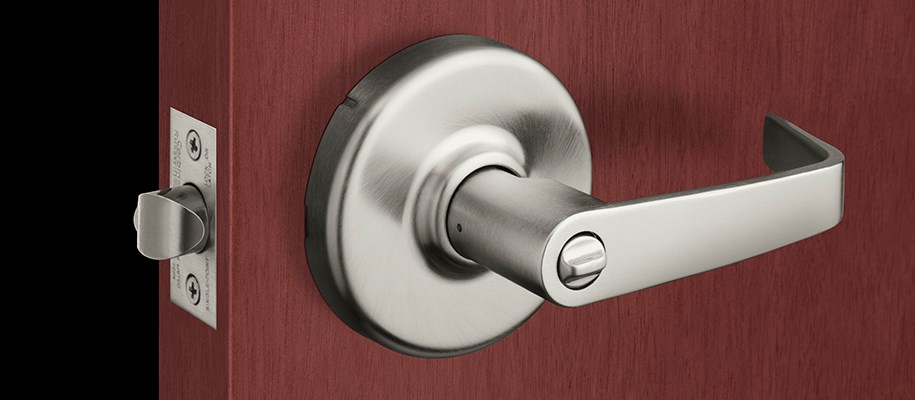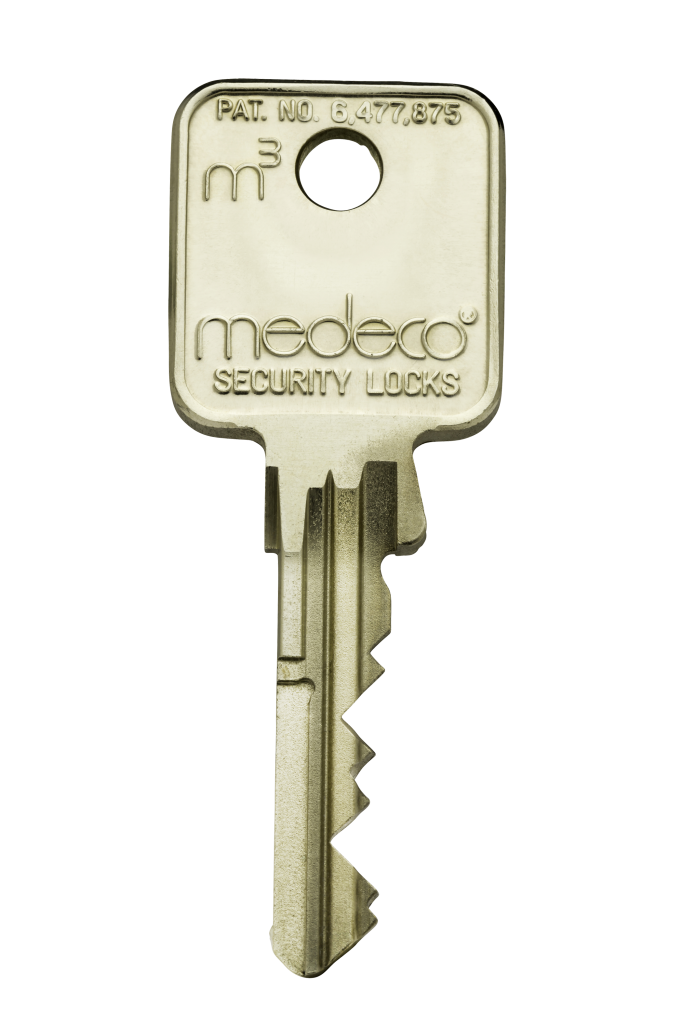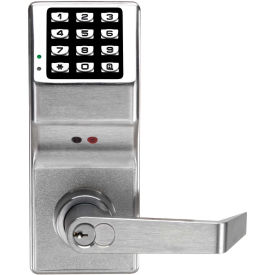Most business owners spend a lot of time designing a security plan for their building. Burglar and fire alarm systems take a lot of thought and preparation to design and install effectively. The same goes for intercom systems, panic buttons, and other security measures. However, the same owners often place very little thought in selecting their commercial lock equipment. Often, they leave these choices completely up to the contractors who install the doors. While this certainly saves time up front, it can also lead to problems down the road. What if the locks chosen do not comply with local regulations? How much security will this hardware provide? Will you need to replace locks to work with security equipment down the road?
In this post, we wish to share the types of questions that you should ask when selecting commercial lock equipment. We’ll begin by looking at lock equipment from legal and security perspectives. From there, we’ll ask a couple questions that you should answer before making any final hardware decisions. Additionally, we’ll help you make sure that you install hardware consistent with your future security plan. Choosing the right equipment now can save you additional expenses down the road. Let’s begin by making sure that you choose lock equipment that your local inspectors will approve.

ADA-Compliant levers, such as this one by lock manufacturer Corbin Russwin, are required on all commercial doors.
Which type of Equipment Will Meet Legal Requirements?
Many business owners install locks with no thought to their legality. Of course, most people are unaware of the laws and codes that govern commercial lock hardware in the first place. The Americans with Disabilities Act (“or ADA”) of 1990 helped create many of these guidelines. Congressed passed this law in order to ensure universal access to commercial buildings. The requirements put in place under this law include minimum guidelines for door openings. They also include specifications on how quickly doors can close. Commercial levers must also meet ADA requirements for handicapped usage. Therefore, using doorknobs instead of levers in almost any commercial application fails to meet these guidelines. This surprises many business owners who have doorknobs installed, only to be told to swap them our for ADA-compliant levers.
Additionally, the International Building Code (IBC) also help inform hardware requirements. Many of these guidelines come directly from the early ADA requirements. For example, most exterior doors in commercial buildings require the capability for exiting with a single motion. This means that rather than installing levers on exterior doors, business owners should install crash bars or push paddles on these doors for easy operation.
Furthermore, different types of businesses may require different types of hardware than others. The International Building Code classifies buildings based on intended use, maximum capacity, and other factors. Knowing what type of business classification you have will help determine what you require for door hardware and security measures. Working with a professional locksmith company such as ourselves can also ensure that you choose the proper equipment. Once you determine what types of equipment you need, let’s look at how to pick out specific hardware that meets your security needs.
What Grade of Lock Do You Need?
Many of our commercial customers find themselves overwhelmed at the amount of lock products on the market. Furthermore, similar-looking products come at wildly differing price points. While confusing, a lot of this has to do with the quality of lock you purchase. The American National Standards Institute (ANSI) and Builders Hardware Manufacturers Association (BHMA) have created a 3-level testing system for lock hardware. Allegion, one of the biggest global providers of security products, provides this helpful guide to door hardware testing. Lock manufacturers often seek out ANSI/BHMA certification for their product lines.
Hardware that meets the strictest criteria receives Grade 1 ANSI/BHMA certification. Grade 2 hardware is less robust than Grade 1. Grade 3 locks are still ANSI/BHMA certified, but we do not recommend them for commercial use. We often find inferior levers installed in high-traffic or high-importance areas of commercial buildings. Exterior doors, high-traffic doors, and doors that have valuable equipment behind them all deserve Grade 1 hardware. These locks will provide added security and longevity. Light-use interior doors may provide a good application for grade 2 lock equipment. In addition to choosing the right grade of locks, you should also create a plan for controlling your keys. Let’s look at a couple different approaches to commercial key control.

Keys that provide key control, such as those that work with Medeco locks, help you track and limit access to keys.
How Will You Control Keys?
As we pointed out in our Security Measures to Improve Employee Safety, even the best mechanical locks are no match for a burglar with the right key. We have a few options for addressing this issue. We can help you create a “master key” system for any major brand of lock. A master key system allows you to control which keys open which doors. For example, you may want to grant an employee front door access only. You may also wish for another employee to have a key that opens every office except for your own. Finally, you’ll likely want to carry one key that opens every door on site. A master key system allows for this time of customization.
Unfortunately, a regular master key system does not help track where keys go, or who makes copies of which key. This means that a janitor who copies a master key could hand that key to anybody else without you knowing. We offer complete key control solutions for those wishing to track and control copies of commercial keys. Elite lock companies, such as our preferred manufacturer Medeco, provide this service.
When we install a Medeco master key system, we also create a list of employees authorized to make key copies. When Medeco customers ask us for a new key, we check their ID against the authorized personnel list. We also individually number each key we make and who we hand it to. Therefore, if a key goes missing we can track who initially took the key, and when. This level of security makes key control a very popular choice for business owners. Let’s look at another important question to address when choosing commercial lock equipment.
Do You Wish to Track Employee Movement?
In our Seven Tips for Employee Tracking in your Business, we discussed different ways to limit access to doors in your business. In that post, we discussed lock hardware that controls and tracks access to certain doors. Many business owners want this security, but do not choose the right commercial lock equipment for it up front. This means that many companies pay for door hardware that gets changed out shortly after installation. Knowing where you want to track access, and how, can save you from this fate. We offer both mechanical and electronic solutions for employee tracking within a business.

Some keypad locks, such as this model by Trilogy, allow you to track who enters a room, and when.
The keypad lock pictured, for example, allows you to print an audit trail by connecting it to a hand-held printer. Decide in advance which doors might need this type of additional security. Planning for this now could prevent you from buying two sets of lock equipment for those doors: one set of levers installed by a contractor, then the keypad locks that you replace them with shortly thereafter. If you wish to install electronic means of employee tracking, or electronic lock hardware connected to an intercom system, you should also plan in advance. Let’s look at making sure you install the right commercial lock equipment for these types of situations.
Will You Need Electronic Lock Hardware?
Much of our commercial lock work involves installing electronic hardware to accomplish different security goals. Our post detailing access control installation explains the process we go through to add an electronic component to existing mechanical lock hardware. The electronics are necessary in order for the lock to answer to a “command” sent to the door. Sometimes this command comes in the form of an employee swiping an access control credential in front of a reader. In this case, the door needs to respond to valid credentials by electronically unlocking for a short period of time. Likewise, if you have an intercom system, a front desk worker sends an “unlocking” command to the door through a button near the desk. In either case, you will need electronic hardware installed in order to make this happen.
Knowing where you will need this hardware can save you both time and money in the long run. Many devices can also be ordered with electronics built in. For example, many exit devices offer options for ordering the device with electrical latch retraction. Installing this device up front can save you from a potentially expensive electronic retrofit or replacement down the road. Additionally, having any electronic lock locations planned out in advance can allow us to better work with your contractors. For example, we may need a specific hole drilled into a door or frame to install an electric strike. With this knowledge, your door contractor could pre-drill your doors to accommodate the electronic lock equipment.
Creating a Complete Plan for Your Commercial Lock Equipment
We hope that this post has given you some insight into commercial lock equipment. The overwhelming amount of options make it quite easy for many business owners to leave the details to others. However, choosing your own lock hardware can help create additional security. It can also minimize the risk of having to replace equipment down the road.
If you have any questions about the material here, we encourage you to contact us. Perhaps you want help making sure you choose the right commercial lock equipment. Or maybe you have equipment in place, but wish to upgrade it for legal or security purposes. Either way, we will be happy to provide a free site survey of your business. While on site, we can review any concerns you have and make suggestions of our own. Together, we can create a complete plan for lock and door hardware that keeps your business as secure as possible.
